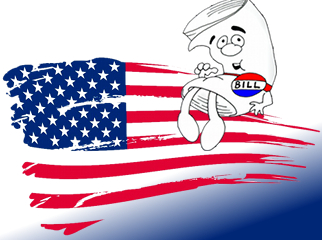 Likely overshadowed by last week’s passage in Nevada of the nation’s first interstate online poker legislation, there’s been no shortage of developments on the state-level legislative front. Starting in NEW JERSEY, the state Assembly is set to vote on their amended iGaming legislation on Tuesday, Feb. 26 at 2pm (live stream available here). Following the vote, the state Senate will cast its vote, then the bill will be whisked off to the man who suggested those amendments, Gov. Chris Christie, to sign it into law.
Likely overshadowed by last week’s passage in Nevada of the nation’s first interstate online poker legislation, there’s been no shortage of developments on the state-level legislative front. Starting in NEW JERSEY, the state Assembly is set to vote on their amended iGaming legislation on Tuesday, Feb. 26 at 2pm (live stream available here). Following the vote, the state Senate will cast its vote, then the bill will be whisked off to the man who suggested those amendments, Gov. Chris Christie, to sign it into law.
On the west coast, CALIFORNIA state Senator Lou Correa has introduced an intrastate online poker bill to compete with the one introduced by Sen. Rod Wright in December. Correa’s SB 678 is short on specifics, having been filed mainly as a ‘placeholder’ to beat Friday’s deadline for submitting legislation for the next session. While Wright’s bill is perceived to benefit the state’s racetracks (particularly the one in his constituency) by including them in the list of eligible licensees, Correa’s previous bill principally reflected the hopes/desires of the state’s tribal gambling interests, particularly the San Manuel Band of Serrano Mission Indians and the Morongo Band of Mission Indians (the principals behind the disbanded California Online Poker Association).
MASSACHUSETTS state Senator Jennifer Flanagan had already unveiled her S101 online lottery bill, which would permit the state lottery to offer ticket sales and “mutli-jurisdictional lottery games” via the interwebz. Now Senator Bruce Tarr has introduced the complementary S197, which would authorize the issuing of licenses “to conduct gaming operations via the internet, provided that such operations do not include or reflect gaming mechanisms operated by the state lottery program of those simulating or resembling slot machines.”
The sports betting bill introduced by MINNESOTA state Rep. Phyllis Kahn has picked up a couple sponsors in Rep. Carly Melin and Rep. Jason Metsa. The future of HF 522 is largely dependent on the outcome of New Jersey’s court fight over the constitutionality of PASPA, the federal prohibition against sports betting outside of four grandfathered states. Minnesota actually passed legislation last year that permitted charities to offer ‘sports-themed tip boards,’ i.e. buying a square on a board to guess the score of a game. But fear of federal blowback has prevented legislators from issuing any such permits.
In the state of WASHINGTON, state Rep. Paul Harris’ proposal to lessen the harsh penalties imposed on online poker players has died in committee. HB 1824 would have reduced the penalty for being caught gambling online from a Class C felony to a Class 3 civil infraction, but the state House Committee on Government Accountability opted not to include the bill in this year’s list of legislative must-do’s. Harris nonetheless claimed a moral victory by even getting the committee to consider the matter and vowed to continue the fight.
Believe it or not, there are those who still believe in the prospects for successful introduction and passage of an online poker bill at the federal level. Speaking at last week’s iGaming North America conference, American Gaming Association president Frank Fahrenkopf claimed all AGA board members, including Las Vegas Sands, now supported a federal poker push. Sands chairman Sheldon Adelson has been one of the more vocal opponents of online gambling, but it’s not clear whether Adelson had changed his tune or was simply letting the Sands board make decisions without regard to his personal opinions. Too little, too late? Fahrenkopf said that with Sen. Jon Kyl (R-AZ) having retired, a new poker bill would require the support of “a conservative Republican from a nongaming state.”
